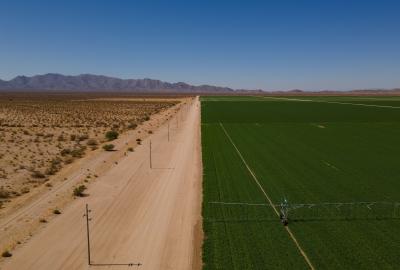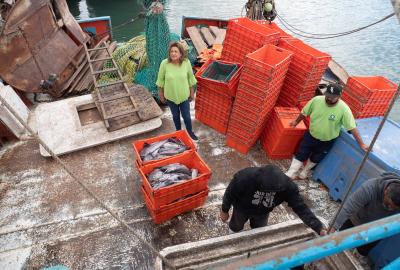Climate change threatens businesses' bottom lines. Now they have to tell us what they're doing about it.
Place a map of sea level rise projections over a map of U.S. internet infrastructure and you’ll find alarming overlaps.
Thousands of miles of fiber optic cables and more than a thousand clusters of key internet infrastructure appear destined to be underwater in the next 15 years. This could disrupt internet service for millions.

Despite this, neither AT&T nor CenturyLink, the companies that own most of the equipment in the flood zones, made any mention of sea-level rise in recent financial filings that were supposed to flag potential risks for investors.
That’s because they haven’t had to.
The U.S. Securities and Exchange Commission, which Congress charged with ensuring that investors have the information they need to make prudent investment decisions, hasn’t, until now, required companies to report specific information about how climate change may affect their operations. So investors may have no idea that a particular corporation has hundreds of millions of dollars tied up in infrastructure at risk of chronic flooding — or in assets that may become obsolete as consumer preferences and policies shift.
But that’s all about to change.
This spring, after years of deliberation, the SEC voted to require large publicly traded companies to disclose the greenhouse gas emissions caused directly by their business operations or by their energy use, if they think a reasonable investor would find that information relevant. The rule will also require all publicly traded companies to disclose any significant ways in which climate change poses risks to their business, and what they are doing to manage those risks.
Stephanie Jones Senior attorney for climate risk at Environmental Defense FundThis isn’t just about protecting investors on Wall Street, it’s about protecting workers, retirees, and anyone with savings invested in the stock market.
The rule was not as far-reaching as the draft rule proposed by the commission in 2022, which would have required companies to report emissions generated from both a company’s suppliers and the use of their products. But, experts say, it is still a crucial and overdue step to protect the country’s economy and people’s financial security from the destruction caused by climate change.
“Climate change poses varied and increasing risks to the economy, and relying on voluntary programs for this information isn’t good enough,” says Stephanie Jones, senior attorney for climate risk at Environmental Defense Fund. “This isn’t just about protecting investors on Wall Street, it’s about protecting workers, retirees, and anyone with savings invested in the stock market.”
The U.S. suffered more than $600 billion in damages from over 100 extreme weather events in just the past five years, and the price tag is rising. The U.S. now experiences a billion-dollar disaster every three weeks, on average; during the 1980s, destruction at that scale only happened three times a year.
- Will they? Won’t they? 4 states to watch for climate action in 2024
- Sustainable investing 101: How to build your nest egg while building a better world
A wide range of businesses and investors have voiced support for standardized reporting of climate risk.
“I would describe the current state of climate reporting as: Choose your own adventure, and grade your own paper. You can hand-pick whatever makes you look good, and ignore the rest,” says Tegan Keele, KPMG Climate Data & Technology Leader. “That’s over. This will set a new baseline expectation of what companies should disclose, in a way that will make it much easier to compare apples-to-apples.”
The rule is expected to face challenges both from groups who think it doesn’t go far enough, and from those who feel the SEC is overreaching.
Dozens of countries, including Chile, China, Egypt, European Union member countries, India, New Zealand and the United Kingdom, already require climate reporting by public companies. And in October, California passed two laws requiring large companies active in the state to give a detailed accounting of their greenhouse gas emissions and climate-related financial risks.
“Preparing for the impacts of climate change goes beyond clearing underbrush to reduce fire risk in the West and restoring wetlands to mitigate flooding on our coasts,” says Jones. “We also have to prepare our financial systems to weather a new reality.”
“Now the SEC should continue building on the strong foundation it set today, so we can make sure investors have the reliable, transparent information they need as threats from climate change continue to grow,” says EDF President, Fred Krupp. “Across our economy, businesses, consumers, and investors will all benefit from strong safeguards.”

